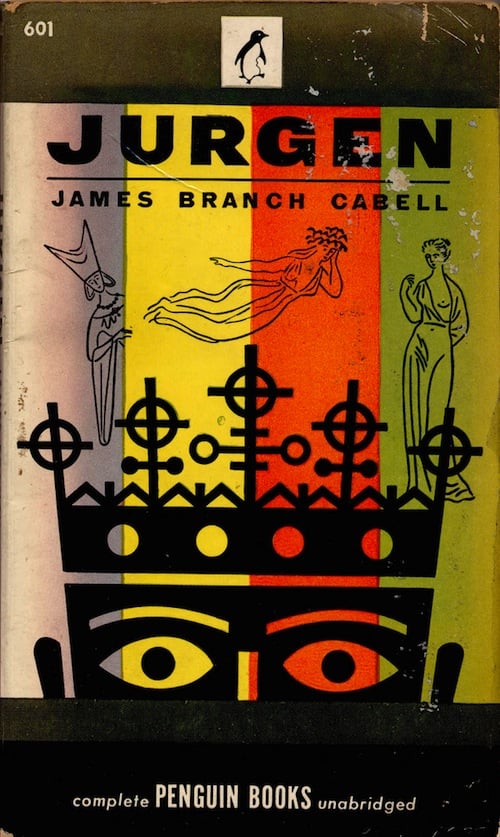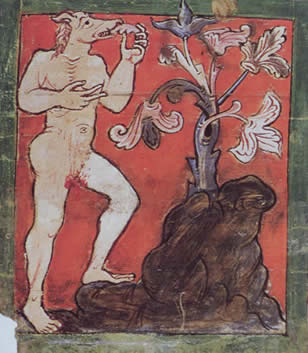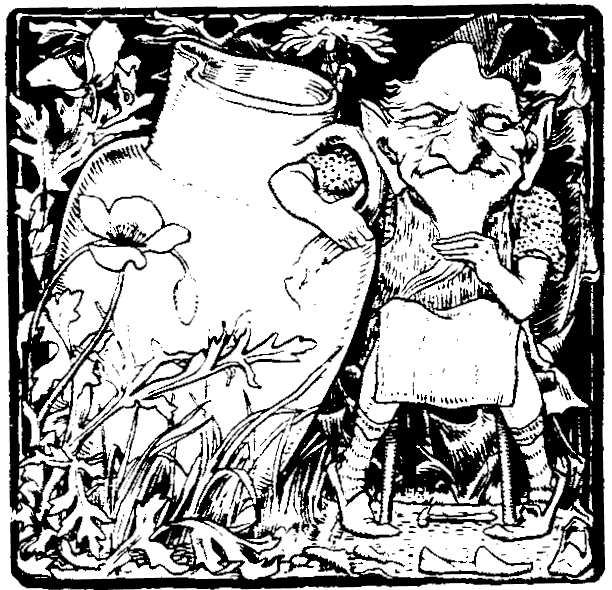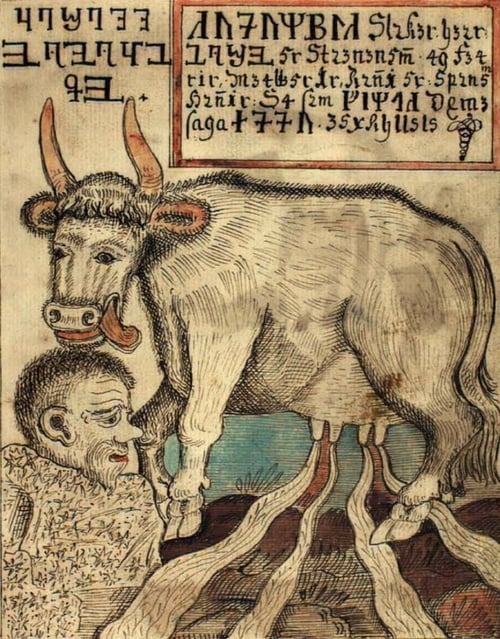Jurgen (6)
By:
April 21, 2015

James Branch Cabell’s 1919 ironic fantasy novel Jurgen, A Comedy of Justice, the protagonist of which seduces women everywhere he travels — including into Arthurian legend and Hell itself — is (according to Aleister Crowley) one of the “epoch-making masterpieces of philosophy.” Cabell’s sardonic inversion of romantic fantasy was postmodernist avant la lettre. HiLoBooks is pleased to serialize Jurgen here at HILOBROW. Enjoy!
“Nessus,” says Jurgen, “and am I so changed? For that Dorothy whom I loved in youth did not know me.”
“Good and evil keep very exact accounts,” replied the Centaur, “and the face of every man is their ledger. Meanwhile the sun rises, it is already another workday: and when the shadows of those two who come to take possession fall full upon the garden, I warn you, there will be astounding changes brought about by the requirements of bread and butter. You have not time to revive old memories by chatting with the others to whom you babbled aforetime in this garden.”
“Ah, Centaur, in the garden between dawn and sunrise there was never any other save Dorothy la Désirée.”

The Centaur shrugged. “It may be you forget; it is certain that you underestimate the local population. Some of the transient visitors you have seen, and in addition hereabouts dwell the year round all manner of imaginary creatures. The fairies live just southward, and the gnomes too. To your right is the realm of the Valkyries: the Amazons and the Cynocephali are their allies: all three of these nations are continually at loggerheads with their neighbors, the Baba-Yagas, whom Morfei cooks for, and whose monarch is Oh, a person very dangerous to name. Northward dwell the Lepracauns and the Men of Hunger, whose king is Clobhair. My people, who are ruled by Chiron, live even further to the north. The Sphinx pastures on yonder mountain; and now the Chimæra is old and generally derided, they say that Cerberus visits the Sphinx at twilight, although I was never the person to disseminate scandal —”

“Centaur,” said Jurgen, “and what is Dorothy doing here?”
“Why, all the women that any man has ever loved live here,” replied the Centaur, “for very obvious reasons.”
“That is a hard saying, friend.”
Nessus tapped with his forefinger upon the back of Jurgen’s hand. “Worm’s-meat! this is the destined food, do what you will, of small white worms. This by and by will be a struggling pale corruption, like seething milk. That too is a hard saying, Jurgen. But it is a true saying.”
“And was that Dorothy whom I loved in youth an imaginary creature?”
“My poor Jurgen, you who were once a poet! she was your masterpiece. For there was only a shallow, stupid and airy, high-nosed and light-haired miss, with no remarkable good looks, — and consider what your ingenuity made from such poor material! You should be proud of yourself.”
“No, Centaur, I cannot very well be proud of my folly: yet I do not regret it. I have been befooled by a bright shadow of my own raising, you tell me, and I concede it to be probable. No less, I served a lovely shadow; and my heart will keep the memory of that loveliness until life ends, in a world where other men follow pantingly after shadows which are not even pretty.”
“There is something in that, Jurgen: there is also something in an old tale we used to tell in Thessaly, about a fox and certain grapes.”
“Well, but look you, Nessus, there is an emperor that reigns now in Constantinople and occasionally does business with me. Yes, and I could tell you tales of by what shifts he came to the throne —”
“Men’s hands are by ordinary soiled in climbing,” quoth the Centaur.
“And ‘Jurgen,’ this emperor says to me, not many months ago, as he sat in his palace, crowned and dreary and trying to cheat me out of my fair profit on some emeralds, — ‘Jurgen, I cannot sleep of nights, because of that fool Alexius, who comes into my room with staring eyes and the bowstring still about his neck. And my Varangians must be in league with that silly ghost, because I constantly order them to keep Alexius out of my bedchamber, and they do not obey me, Jurgen. To be King of the East is not to the purpose, Jurgen, when one must submit to such vexations.’ Yes, it was Cæsar Pharamond himself said this to me: and I deduce the shadow of a crown has led him into an ugly pickle, for all that he is the mightiest monarch in the world. And I would not change with Cæsar Pharamond, not I who am a respectable pawnbroker, with my home in fee and my bit of tilled land. Well, this is a queer world, to be sure: and this garden is visited by no stranger things than pop into a man’s mind sometimes, without his knowing how.”
“Ah, but you must understand that the garden is speedily to be remodeled. Yonder you may observe the two whose requirements are to rid the place of all fantastic unremunerative notions; and who will develop the natural resources of this garden according to generally approved methods.”
And from afar Jurgen could see two figures coming out of the east, so tall that their heads rose above the encircling hills and glistened in the rays of a sun which was not yet visible. One was a white pasty-looking giant, with a crusty expression: he walked with the aid of a cane. The other was of a pale yellow color: his face was oily, and he rode on a vast cow that was called Ædhumla.

“Make way there, brother, with your staff of life,” says the yellow giant, “for there is much to do hereabouts.”
“Ay, brother, this place must be altered a deal before it meets with our requirements,” the other grumbled. “May I be toasted if I know where to begin!”
Then as the giants turned dull and harsh faces toward the garden, the sun came above the circle of blue hills, so that the mingled shadows of these two giants fell across the garden. For an instant Jurgen saw the place oppressed by that attenuated mile-long shadow, as in heraldry you may see a black bar painted sheer across some brightly emblazoned shield. Then the radiancy of everything twitched and vanished, as a bubble bursts.
And Jurgen was standing in the midst of a field, very neatly plowed, but with nothing as yet growing in it. And the Centaur was with him still, it seemed, for there were the creature’s hoofs, but all the gold had been washed or rubbed away from them in traveling with Jurgen.
“See, Nessus!” Jurgen cried, “the garden is made desolate. Oh, Nessus, was it fair that so much loveliness should be thus wasted!”
“Nay,” said the Centaur, “nay!” Long and wailingly he whinneyed, “Nay!”
And when Jurgen raised his eyes he saw that his companion was not a centaur, but only a strayed riding-horse.
“Were you the animal, then,” says Jurgen, “and was it a quite ordinary animal, that conveyed me to the garden between dawn and sunrise?” And Jurgen laughed disconsolately. “At all events, you have clothed me in a curious fine shirt. And, now I look, your bridle is marked with a coronet. So I will return you to the castle at Bellegarde, and it may be that Heitman Michael will reward me.”
Then Jurgen mounted this horse and rode away from the plowed field wherein nothing grew as yet. As they left the furrows they came to a signboard with writing on it, in a peculiar red and yellow lettering.
Jurgen paused to decipher this.
“Read me!” was written on the signboard: “read me, and judge if you understand! So you stopped in your journey because I called, scenting something unusual, something droll. Thus, although I am nothing, and even less, there is no one that sees me but lingers here. Stranger, I am a law of the universe. Stranger, render the law what is due the law!”
Jurgen felt cheated. “A very foolish signboard, indeed! for how can it be ‘a law of the universe’, when there is no meaning to it!” says Jurgen. “Why, for any law to be meaningless would not be fair.”
Footnotes from Notes on Jurgen (1928), by James P. Cover — with additional comments from the creators of this website; rewritten, in some instances, by HiLoBooks.
* Valkyries — In Norse myth, the Valkyries were female warriors, who carried the souls of those slain in battle to Valhalla, and there attended them at banquets.
* Amazons — The Amazons were a mythical race of female warriors who brought up only their daughters, either killing or sending away their sons.
* Cynocephali — In the Middle Ages it was generally believed that there existed, somewhere in the remote parts of the earth, a race of satyrs, with bodies like men and heads like hounds, who were called Cynocephali.
* Baba-Yagas — The Baba-Yaga is the Russian witch, a huge, gaunt hag, with disheveled hair and a nose so long it projects through the ceiling when she lies down. She lives in a house built on fowl’s legs, that turns around to face the forest at her command; and she rides in a mortar, using a pestle for a whip and sweeping away all traces of her flight with a broom. She lives on human flesh, which she bakes nicely in her oven before eating it.
* Morfei — In Russian folk-lore, Morfei is a magic cook who can supply, in any amount, any kind of food his master may demand.
* Oh — In Russian folk-lore, Oh is a magician who sometimes appears upon the calling of his name. In one case the invocation was, “Oh, I am so tired.”
* Lepracauns — In Irish folk-lore, the lepracaun is a fairy shoemaker, a little old man seen always alone and working on one shoe only. He is a miser and very rich.
* Men of Hunger — In Irish folk-lore, the Fear-Gorta, or Man of Hunger, is an emaciated phantom that goes through the land in time of famine, begging for alms and bringing good luck to the giver.
* Clobhair — In Irish folk-lore, the Clobhair-ceann, or Cluricaun, is a fairy, greatly resembling the lepracaun, who steals into wine cellars and makes himself drunk.
* Chiron — In Greek mythology, Chiron was the wisest of the Centaurs, and their king.
* The Sphinx — The Sphinx was a fabulous monster, part woman and part lion, which infested the highway near the city of Thebes, asking a riddle of all who passed by and killing all who could not answer it. Œdipus answered the riddle, and the Sphinx killed herself in mortification.
* The Chimæra — The Chimæra was a mythological monster which breathed fire, and whose body was composed of the parts of a lion, a goat, and a dragon. It was killed by Bellerophon, riding on Pegasus.
* Cerberus — Cerberus was the three-headed dog that guarded the entrance to Hades.
* Caesar Pharamond — This was, perhaps, Andronicus Comnenus, born in the early part of the twelfth century. When Alexius II succeeded to the throne of the Eastern Roman Empire, and, by his conduct, caused popular indignation, Andronicus marched on Constantinople and was soon master of the situation. In 1180, having married the daughter of Alexius, he was proclaimed co-emperor with him. In 1183 he caused Alexius to be strangled with a bow-string. Jurgen, who was not born until 1235, could have had no dealings with Andronicus; so in later editions of the book the name of this emperor is changed to Palæologus; who, as Michael VIII, ruled over the Eastern Roman Empire from 1260 to 1282.
* The Giants — The giants are Bread and Butter, so that the garden may be altered, as is predicted at the beginning of the chapter, “by the requirements of bread and butter.”
* Ædhumla — In Norse mythology, Ædhumla was the cow of Ymir, the first living being in the universe. Ædhumla licked out of the rocks the figure of a man, who became the progenitor of the gods.
RADIUM AGE SCIENCE FICTION: “Radium Age” is HILOBROW’s name for the 1904–33 era, which saw the discovery of radioactivity, the revelation that matter itself is constantly in movement — a fitting metaphor for the first decades of the 20th century, during which old scientific, religious, political, and social certainties were shattered. This era also saw the publication of genre-shattering writing by Edgar Rice Burroughs, Sax Rohmer, E.E. “Doc” Smith, Jack London, Arthur Conan Doyle, Aldous Huxley, Olaf Stapledon, Karel Čapek, H.P. Lovecraft, Charlotte Perkins Gilman, Yevgeny Zamyatin, Philip Gordon Wylie, and other pioneers of post-Verne/Wells, pre-Golden Age “science fiction.” More info here.
READ GORGEOUS PAPERBACKS: HiLoBooks has reissued the following 10 obscure but amazing Radium Age science fiction novels in beautiful print editions: Jack London’s The Scarlet Plague, Rudyard Kipling’s With the Night Mail (and “As Easy as A.B.C.”), Arthur Conan Doyle’s The Poison Belt, H. Rider Haggard’s When the World Shook, Edward Shanks’ The People of the Ruins, William Hope Hodgson’s The Night Land, J.D. Beresford’s Goslings, E.V. Odle’s The Clockwork Man, Cicely Hamilton’s Theodore Savage, and Muriel Jaeger’s The Man with Six Senses. For more information, visit the HiLoBooks homepage.
SERIALIZED BY HILOBOOKS: Jack London’s The Scarlet Plague | Rudyard Kipling’s With the Night Mail (and “As Easy as A.B.C.”) | Arthur Conan Doyle’s The Poison Belt | H. Rider Haggard’s When the World Shook | Edward Shanks’ The People of the Ruins | William Hope Hodgson’s The Night Land | J.D. Beresford’s Goslings | E.V. Odle’s The Clockwork Man | Cicely Hamilton’s Theodore Savage | Muriel Jaeger’s The Man With Six Senses | Jack London’s “The Red One” | Philip Francis Nowlan’s Armageddon 2419 A.D. | Homer Eon Flint’s The Devolutionist | W.E.B. DuBois’s “The Comet” | Edgar Rice Burroughs’s The Moon Men | Charlotte Perkins Gilman’s Herland | Sax Rohmer’s “The Zayat Kiss” | Eimar O’Duffy’s King Goshawk and the Birds | Frances Hodgson Burnett’s The Lost Prince | Morley Roberts’s The Fugitives | Helen MacInnes’s The Unconquerable | Geoffrey Household’s Watcher in the Shadows | William Haggard’s The High Wire | Hammond Innes’s Air Bridge | James Branch Cabell’s Jurgen | John Buchan’s “No Man’s Land” | John Russell’s “The Fourth Man” | E.M. Forster’s “The Machine Stops” | John Buchan’s Huntingtower | Arthur Conan Doyle’s When the World Screamed | Victor Bridges’ A Rogue By Compulsion | Jack London’s The Iron Heel | H. De Vere Stacpoole’s The Man Who Lost Himself | P.G. Wodehouse’s Leave It to Psmith | Richard Connell’s “The Most Dangerous Game” | Houdini and Lovecraft’s “Imprisoned with the Pharaohs” | Arthur Conan Doyle’s “The Sussex Vampire”.
ORIGINAL FICTION: HILOBROW has serialized three novels: James Parker’s The Ballad of Cocky The Fox (“a proof-of-concept that serialization can work on the Internet” — The Atlantic); Karinne Keithley Syers’s Linda Linda Linda (which includes original music); and Robert Waldron’s roman à clef The School on the Fens. We also publish original stories and comics. These include: Matthew Battles’s stories “Gita Nova“, “Makes the Man,” “Imago,” “Camera Lucida,” “A Simple Message”, “Children of the Volcano”, “The Gnomon”, “Billable Memories”, “For Provisional Description of Superficial Features”, “The Dogs in the Trees”, “The Sovereignties of Invention”, and “Survivor: The Island of Dr. Moreau”; several of these later appeared in the collection The Sovereignties of Invention | Peggy Nelson’s “Mood Indigo“, “Top Kill Fail“, and “Mercerism” | Annalee Newitz’s “The Great Oxygen Race” | Flourish Klink’s Star Trek fanfic “Conference Comms” | Charlie Mitchell’s “A Fantasy Land” | Charlie Mitchell’s “Sentinels” | Joshua Glenn’s “The Lawless One”, and the mashup story “Zarathustra vs. Swamp Thing” | Adam McGovern and Paolo Leandri’s Idoru Jones comics | John Holbo’s “Sugarplum Squeampunk” | “Another Corporate Death” (1) and “Another Corporate Death” (2) by Mike Fleisch | Kathryn Kuitenbrouwer and Frank Fiorentino’s graphic novel “The Song of Otto” (excerpt) | John Holbo’s graphic novel On Beyond Zarathustra (excerpt) | “Manoj” and “Josh” by Vijay Balakrishnan | “Verge” by Chris Rossi, and his audio novel Low Priority Hero | EPIC WINS: THE ILIAD (1.408-415) by Flourish Klink | EPIC WINS: THE KALEVALA (3.1-278) by James Parker | EPIC WINS: THE ARGONAUTICA (2.815-834) by Joshua Glenn | EPIC WINS: THE MYTH OF THE ELK by Matthew Battles | TROUBLED SUPERHUMAN CONTEST: Charles Pappas, “The Law” | CATASTROPHE CONTEST: Timothy Raymond, “Hem and the Flood” | TELEPATHY CONTEST: Rachel Ellis Adams, “Fatima, Can You Hear Me?” | OIL SPILL CONTEST: A.E. Smith, “Sound Thinking | LITTLE NEMO CAPTION CONTEST: Joe Lyons, “Necronomicon” | SPOOKY-KOOKY CONTEST: Tucker Cummings, “Well Marbled” | INVENT-A-HERO CONTEST: TG Gibbon, “The Firefly” | FANFICTION CONTEST: Lyette Mercier’s “Sex and the Single Superhero”
